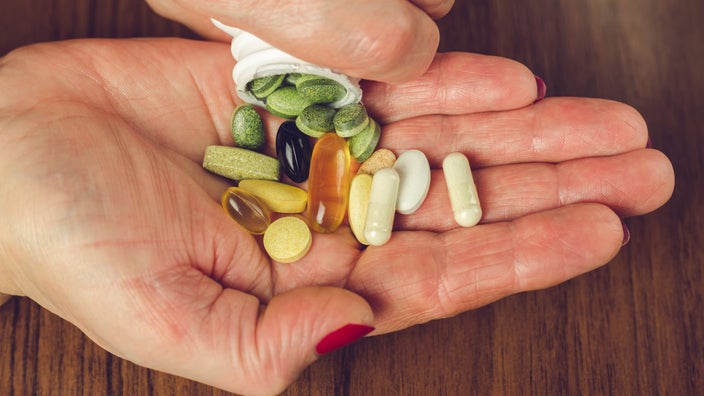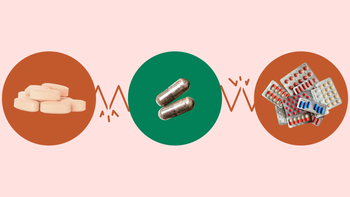
9 Vitamins and Supplements to Consider If You Are Vegan
Key takeaways:
Following a vegan diet may put you at a higher risk for nutrient and vitamin deficiencies — especially vitamin B12.
In some cases, supplements and vitamins can help fill in the nutritional gaps that come with being vegan.
Talk to a healthcare professional before beginning any supplement regimen, especially if you’re pregnant or breastfeeding.
Table of contents

A well-planned vegan diet can meet most of your nutrient needs. But some vitamins and minerals are difficult (or even impossible) to get from plants alone. Supplements may be able to bridge this gap and prevent nutrient deficiencies.
Vitamins and supplements for vegans
Below are nine of the most crucial vitamins for a vegan diet to support energy, bone health, mood, and more.
One note: The Dietary Reference Intakes (DRIs) provides the daily recommendations for different macronutrients, vitamins, and minerals. A nutritionally adequate diet should aim to meet all of these requirements for optimal health. The recommendations for most vitamins and minerals below are based on the amounts listed in the DRIs.
Search and compare options
1. Vitamin B12
Vitamin B12 is only found in animal products like meat, dairy, and eggs. So, vegans may need to supplement B12 — either by eating fortified foods or taking a B12 vitamin.
Vitamin B12 is essential for mental and physical health. It plays a role in nervous system function, red blood cell formation, and DNA synthesis. A B12 deficiency can lead to anemia, which is when you don’t have enough red blood cells to carry oxygen properly. Low B12 levels can also result in irreversible nerve damage.
Which vegan foods have B12?
Most plant foods don’t contain B12. The exception is dried purple laver, or nori, which is a dried seaweed. Other vegetables that contain very small amounts of B12 include:
Broccoli
Asparagus
Mung bean sprouts
Kimchi
If you’re vegan, your best options for getting B12 from foods is by eating fortified:
Breakfast cereals
Meat substitutes
Plant-based milk
How much B12 should I take?
The Recommended Dietary Allowance (RDA) for B12 is 2.4 mcg for most adults. If you’re pregnant or nursing, the recommended amount increases slightly.
The best plant-based protein sources for vegans: Protein foods for vegans include lentils, beans, and nuts. But there are plenty of other options for getting the protein your body needs.
Nutritional yeast’s health benefits: Fortified “nooch” provides vitamin B12, folic acid, and other nutrients that may be hard to get through food alone — especially for vegans.
Which medications contain animal byproducts? Certain medications contain animal byproducts to boost their effectiveness or production process. But animal-free alternatives are often available.
B12 is available in tablet form or a sublingual (under the tongue) lozenge. It’s also available as a prescription shot or nasal spray.
2. Iron
While many vegan foods contain iron, plant-based iron isn’t absorbed very well by your body. Because of this, vegans need to eat more iron-rich foods than those who consume animal proteins. Some vegans may also need to take a daily iron supplement.
Iron is required to help your red blood cells carry oxygen throughout your body. Without iron, red blood cells can’t perform this important function.
Read more like this
Explore these related articles, suggested for readers like you.
Which vegan foods have iron?
Vegan foods with iron include:
Beans and lentils
Tofu
Cruciferous vegetables
Spinach
Nuts
Potatoes
Fortified breakfast cereals
Fortified breads
How much iron should I take?
The amount of iron you need depends on your sex assigned at birth and whether you eat animal products. Vegans need the following (approximate) daily amounts of iron:
Adult vegan men aged 19 to 50: 16 mg
Adult vegan women aged 19 to 50: 36 mg
All adult vegans aged 51 and older: 16 mg
Some people may need higher amounts of iron, including those who:
Are pregnant or lactating
Have heavy periods
Have gastrointestinal conditions such as celiac disease, ulcerative colitis, or Crohn’s disease
Keep in mind that too much iron can be harmful. Your daily total iron intake shouldn’t be above 45 mg unless a healthcare professional prescribes a higher dose.
3. Vitamin D
Vitamin D is different from other vitamins because your body can make it from sunlight. It’s also possible to get it from a few foods, like fatty fish and eggs.
One of vitamin D’s roles is to help your body absorb calcium and phosphorus for bone health. Vitamin D is also essential for immune function, muscle recovery, and mood.
Which vegan foods have vitamin D?
There aren’t many foods that naturally contain vitamin D. Because of this, many packaged foods in the U.S. have vitamin D added.
Vegan foods that contain vitamin D include:
Fortified plant-based milks (like soy, almond, or oat)
Fortified breakfast cereals
Fortified orange juice
Mushrooms that are grown in sunlight or under a UV lamp
How much vitamin D should I take?
The recommended daily amount of vitamin D you need depends on your age:
600 IU for adults ages 19 to 70
800 IU for adults ages 71 and older
People with certain medical conditions or those on certain medications may need different amounts.
If you’re looking for a vitamin D supplement, choose vitamin D3 (cholecalciferol). This form is best absorbed. Keep in mind that some D3 supplements aren’t vegan, as they’re made from fish or sheep lanolin. Be sure to look for a vegan D3 product.
4. Omega-3 fatty acids
Omega-3 fatty acids are essential fats that must come from your diet. Omega-3s play a role in brain, heart, and immune health. They may also help control inflammation and lower your risk of chronic health conditions.
Even though some vegan foods contain omega-3s, they don’t contain the active form known as eicosapentaenoic acid (EPA) and docosahexaenoic acid (DHA).
Instead, they contain a type of omega-3 called alpha-linoleic acid (ALA). Your body can convert ALA into the more active forms of omega-3s that are easier for your body to use. But this conversion process isn’t efficient. Because of this, vegans may not always get enough omega-3s.
Which vegan foods have omega-3s?
Vegan foods that contain omega-3s include:
Chia seeds
Flaxseed
Walnuts
Plant oils (like canola oil, flaxseed oil, olive oil)
Fortified packaged foods
How much omega-3s should I take?
The adequate intake for omega-3 fatty acids is 1.6 g for adult men and 1.1 g for adult women. (There’s no established recommended amount for the different types of omega-3s.) But taking more than 4 g per day of omega-3s may raise “bad” low-density lipoprotein (LDL) cholesterol.
With the popularity of vegan diets, it’s now possible to buy vegan omega-3 supplements that contain ALA, EPA, and DHA sourced from algae. It’s best to look for a product that includes all three of these omega-3 fats.
5. Calcium
Vegan diets exclude dairy, a common source of calcium. So, you’ll need to get plant-based sources of calcium to support a healthy vegan diet.
Calcium is needed to keep bones and teeth strong. It also plays a role in heart health and muscle function. Not getting enough calcium can result in weak bones and fractures.
Which vegan foods have calcium?
Many plant foods are good sources of calcium, including:
Tofu (especially if it’s calcium-fortified)
Green leafy vegetables
Broccoli
Chinese cabbage
Fortified plant milks
Fortified grains and cereals
Fortified fruit juice
How much calcium should I take?
The RDA for calcium is as follows:
1,000 mg for adult men, ages 19 to 70
1,000 mg for adult women, ages 19 to 50
1,200 mg for adult women, ages 51 to 70
1,200 mg for adults ages 71 and older
Calcium citrate and calcium carbonate are two common types of calcium supplements. Each has different benefits, so talk to a healthcare professional to see which one might be the best option for you.
6. Vitamin K
Vitamin K is a fat-soluble vitamin. This means it’s absorbed along with fats in your diet and stored in your liver and in your body’s fatty tissue. There are two types: vitamin K1 and vitamin K2.
Vitamin K1 comes from plant-based foods and makes up most of the vitamin K in people’s diets. In contrast, vitamin K2 is found in animal products and fermented foods. Your gut bacteria can turn vitamin K1 into vitamin K2.
Vitamin K is involved in blood clotting and bone health. Without it, your blood cannot form clots. And low vitamin K levels increases your risk for weak bones and fractures.
Which vegan foods have vitamin K?
Vitamin K is found in many foods, including plants and fermented foods. Vegan foods rich in vitamin K include:
Green leafy vegetables
Broccoli
Lettuce
Vegetable oils
Blueberries
Figs
Soybeans
Fermented foods (like kimchi, yogurt, miso, and kefir)
How much vitamin K should I take?
The RDA for vitamin K is 120 mcg for adult men and 90 mcg for adult women.
Vitamin K is available as an over-the-counter (OTC) supplement. Vitamin K supplements are made from either K1 or K2 forms of the vitamin. The best type might depend on why you’re taking it. So, talk to a healthcare professional about which type might be best for you. Different types of vitamin K include:
Phylloquinone
Phytonadione
Menaquinone-4
Menaquinone-7
Keep in mind that vitamin K can interact with other medications. If you take Coumadin (a blood thinner), it’s especially important to discuss your vitamin K intake with your prescriber.
7. Iodine
Iodine is a mineral that’s vital for thyroid, bone, and brain health. Iodine deficiency in the U.S. is rare — most people are able to get enough iodine from iodized salt, seafood, and dairy products. But in some cases, vegans can have low iodine levels.
Iodine is required to make thyroid hormones. A deficiency can lead to thyroid problems including hypothyroidism. It can also cause problems with physical, sexual, and intellectual development.
Which vegan foods have iodine?
Iodized salt is the best source of iodine for vegans. Keep in mind that many specialty salts (like Himalayan salt or kosher salt) don’t contain iodine. Be sure to read the label of your salt to make sure it includes iodine.
Seaweed is another rich source of iodine but should only be eaten in moderation since it can contain toxic heavy metals like arsenic, mercury, and lead. Eating too much seaweed may also raise your iodine levels too high. And high iodine levels can cause thyroid problems over time.
How much iodine should I take?
The RDA for iodine is 150 mcg for most adults. Too much iodine can be harmful. So, make sure your iodine intake doesn’t exceed 1,100 mcg per day unless specifically prescribed a higher dose by a healthcare professional.
8. Zinc
Zinc is an important nutrient for many bodily processes. While it’s found in both animal and plant foods, vegans may have a hard time getting enough zinc. This is because some plant-based foods — such as beans and grains — contain a substance that can make it harder for your body to absorb zinc.
Zinc is required for proper metabolism, immune function, and wound healing. A deficiency can lead to:
Low immunity
Hair loss
Diarrhea
Slow growth in children
Which vegan foods have zinc?
Many plant-based foods contain zinc, including:
Oatmeal
Nuts
Lentils
Yogurt
Pumpkin seeds
How much zinc should I take?
The RDA for zinc is 11 mg for men and 8 mg to 9 mg for women. Pregnant and lactating people may need to take more.
Taking too much zinc can be harmful. You shouldn’t get more than 40 mg per day unless a healthcare professional has specifically prescribed a higher dose.
9. Selenium
Selenium is an essential trace mineral. This means your body needs it to function, but only in very small amounts.
Selenium makes the proteins your body needs for things like thyroid function, fertility, and your immune system. As an antioxidant, it also plays a role in fixing damaged cells in your body.
Vegans aren’t necessarily at risk for selenium deficiency, but they may get slightly less selenium through their diets compared to those who eat animal products. This is because several foods that contain selenium are animal-based, such as fish, poultry, and beef.
Which vegan foods have selenium?
You can still get selenium from plant-based foods. Vegan sources of selenium include:
Nuts (especially Brazil nuts, which are so high in selenium that a single nut can provide your daily requirement)
Seeds (chia, sunflower, flax)
Grains (pasta, quinoa, brown rice, lentils, breads, oatmeal)
Mushrooms (cremini, portobella, white)
Note that the amount of selenium in your food depends on the soil where it’s grown. Often, the exact selenium content is unknown since it’s not always listed on food labels.
How much selenium should I take?
The recommended daily amount for selenium is 55 mcg. This increases to 60 mcg during pregnancy and 70 mcg during breastfeeding.
You don’t need — and shouldn’t take — selenium supplements unless you have low levels. This is because getting too much selenium through food and supplements can cause selenium toxicity.
Selenium supplements are available as capsules, tablets, or oral liquid. The recommended limit for adults is 400 mcg/day.
Should you take a vegan multivitamin?
Many people reach for a multivitamin as a quick way to cover all their nutritional bases. But research is mixed on whether multivitamins are actually effective. For the general population, multivitamins may not be the best choice. But vegans may benefit from taking one.
How to choose a vegan multivitamin
When choosing a vegan multivitamin, keep the following tips in mind:
The FDA doesn’t test supplements for safety and effectiveness. Look for third-party verification, such as from the USP or NSF, which ensures that the vitamin contains what the label says it contains.
Check the specific nutrient breakdown and make sure it provides adequate amounts of the vitamins and minerals you need. Most multivitamins contain the nutrients listed above (and more), but they may not include omega-3 fatty acids. If you’re concerned about your omega-3 intake, consider taking a separate supplement.
Verify that the supplement itself is vegan. Some companies use gelatin capsules or other ingredients that aren’t compatible with a vegan diet. However, many brands offer vegan-friendly multivitamins.
Keep in mind that the right multivitamin for one person may not be a fit for another. It’s crucial to consult with a healthcare professional to figure out the right dosage and type for your individual needs.
Frequently asked questions
When following a vegan diet, it takes a little extra care to make sure you meet all your nutrient needs. Because you’re eliminating entire food groups, it’s important to make sure you’re getting enough vitamins and minerals.
Plants are missing some of the vitamins, minerals, and essential fatty acids that are plentiful in meat and dairy. For vegans, eating fortified foods or taking supplements can help fill any nutritional gaps and prevent deficiencies.
The bottom line
Food is the preferred way to get vitamins and minerals, but a vegan diet may lack important nutrients. If you’re vegan — or thinking about becoming one — you may want to consider taking supplements to help optimize your nutrition. Be sure to talk to a healthcare professional before choosing a supplement to make sure you’re getting the right nutrients for your needs.
Why trust our experts?



References
Bakaloudi, D. R., et al. (2021). Intake and adequacy of the vegan diet. A systematic review of the evidence. Clinical Nutrition.
Burns-Whitmore, B., et al. (2019). Alpha-linolenic and linoleic fatty acids in the vegan diet: Do they require dietary reference intake/adequate intake special consideration? Nutrients.
Cheery, P., et al. (2019). Risks and benefits of consuming edible seaweeds. Nutrition Reviews.
Conly, J. M., et al. (1992). The production of menaquinones (vitamin K2) by intestinal bacteria and their role in maintaining coagulation homeostasis. Progress in Food and Nutrition Science.
Dietary Reference Intakes for Calcium and Vitamin D. (2011). Dietary reference intakes (DRIs): Recommended dietary allowances and adequate intakes, vitamins. National Academy of Sciences.
Dietary Reference Intakes for Sodium and Potassium. (2019). Dietary reference intakes (DRIs): Recommended dietary allowances and adequate intakes, elements. National Academy of Sciences.
Earl, L. (2013). Vitamin K and coumadin - what you need to know. National Blood Clot Alliance.
Institute of Medicine (US) Panel on Micronutrients. (2001). 8 Iodine. Dietary Reference Intakes for Vitamin A, Vitamin K, Arsenic, Boron, Chromium, Copper, Iodine, Iron, Manganese, Molybdenum, Nickel, Silicon, Vanadium, and Zinc.
Kamangar, F., et al. (2012). Vitamin and mineral supplements: Do we really need them? International Journal of Preventive Medicine.
Maares, M., et al. (2020). A guide to human zinc absorption: General overview and recent advances of in vitro intestinal models. Nutrients.
Melina, V., et al. (2016). Position of the Academy of Nutrition and Dietetics: Vegetarian diets. Journal of the Academy of Nutrition and Dietetics.
NSF. (n.d.). Certification.
Office of Dietary Supplements. (n.d.). Nutrient recommendations and databases. National Institutes of Health.
Office of Dietary Supplements. (2021). Vitamin K: Fact sheet for health professionals. National Institutes of Health.
Office of Dietary Supplements. (2023). Iron: Fact sheet for consumers. National Institutes of Health.
Office of Dietary Supplements. (2023). Omega-3 fatty acids: Fact sheet for health professionals. National Institutes of Health.
Office of Dietary Supplements. (2023). Vitamin B12: Fact sheet for consumers. National Institutes of Health.
Office of Dietary Supplements. (2024). Iodine: Fact sheet for health professionals. National Institutes of Health.
Office of Dietary Supplements. (2024). Multivitamin/mineral supplements: Fact sheet for health professionals. National Institutes of Health.
Office of Dietary Supplements. (2024). Selenium: Fact sheet for health professionals. National Institutes of Health.
Office of Dietary Supplements. (2024). Vitamin D: Fact sheet for health professionals. National Institutes of Health.
Plourde, M., et al. (2007). Extremely limited synthesis of long chain polyunsaturates in adults: Implications for their dietary essentiality and use as supplements. Applied Physiology, Nutrition, and Metabolism.
Schwalfenberg, G. K., et al. (2017). Vitamins K1 and K2: The emerging group of vitamins required for human health. Journal of Nutrition and Metabolism.
Tarvainen, M., et al. (2019). Determination of vitamin K composition of fermented food. Food Chemistry.
U.S. Food and Drug Administration. (2024). Dietary supplements.
U.S. Pharmacopeial Convention. (n.d.). USP verified mark.
Watanabe, F., et al. (2014). Vitamin B12-containing plant food sources for vegetarians. Nutrients.





























